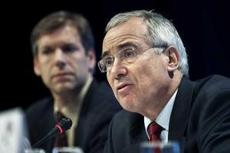 How seriously are we to take Lord Stern on the economics of climate change? At the LSE yesterday, he rather hysterically claimed that the Copenhagen summit will be “the most important international gathering since the Second World War”. Crucially, he added that the cost of dealing with the problem may reach 5 percent of GDP. Even so, “it would still be a good deal,” he said.
How seriously are we to take Lord Stern on the economics of climate change? At the LSE yesterday, he rather hysterically claimed that the Copenhagen summit will be “the most important international gathering since the Second World War”. Crucially, he added that the cost of dealing with the problem may reach 5 percent of GDP. Even so, “it would still be a good deal,” he said.
Really? Losing world economic growth condemns millions in the Third World to poverty: the globalisation of the last 15 years has been the greatest anti-poverty tool ever invented. So we should not be blasé about sacrificing growth, as if all it means is smaller cars for the rich. Poverty kills, and so will forfeited economic growth.
Stern would argue that climate change also kills. And then we play that daft game where we transpose the supposed sea levels of 2100 on to today’s Bangladesh, conveniently forgetting that, under the IPCC scenario, it would be as rich as the Netherlands is today by then and, ergo, able to build the odd flood defence.
So what kills more: climate change, or the economic sacrifices which halo-seeking leaders of the rich world wish to make in hope of abating that climate change? It is, brutally, an economic calculation.
I write this, by the way, as someone who believes that the planet is warming due, at least in part, to human activities. But belief in climate change does not mean blindly accepting everything done in its name. People like Stern should calculate the other side of the ledger: what would we lose? How many lives would be lost due to forfeited GDP? Stern has to give a cost benefit analysis to his proposasl: i.e. the extent to which his solution would mitigate the problem he outlined in his 2005 report.
In tomorrow’s Spectator we have an excellent critique of Lord Stern by Robert Mendelsohn of Yale University. It goes some way to advancing something sorely lacking from the global warming agenda: rational debate.







Comments